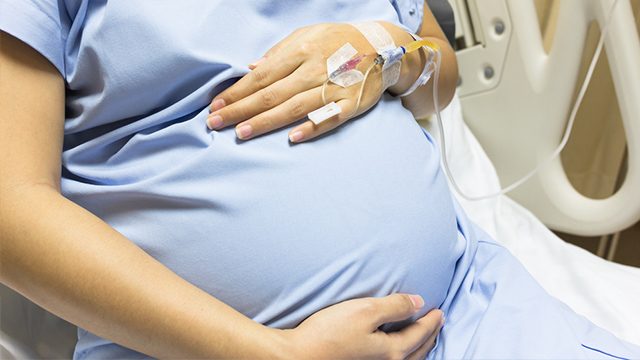SUMMARY
This is AI generated summarization, which may have errors. For context, always refer to the full article.

MANILA, Philippines – Recent studies examining pregnant mothers with coronavirus disease (COVID-19) found that there is not enough evidence to conclude they can pass the disease to their unborn babies.
Sybil Bravo, division chief for the OB GYN (obstetrics and gynecology) infectious diseases department in the Philippine General Hospital and Manila Doctors Hospital, presented several studies on pregnant women with COVID-19 in the COVIDgilance webinar on March 24.
Based on the experiences of SARS (Severe Acute Respiratory Syndrome) and MERS (Middle East Respiratory Syndrome) outbreaks from the past, pregnant women had severe outcomes compared to non-pregnant women.
Although a baby in China tested positive for COVID-19 after the mother gave birth, it was not concluded that it was a vertical transmission, or intrauterine transmission through the placenta of the mother while the baby was unborn.
Wuhan-based studies
One study focused on 9 mothers admitted in Wuhan hospitals late January 2020. The women exhibited the following symptoms:
- fever (7 out of 9)
- cough (4 out of 9)
- myalgia or muscle pain (3 out of 9)
- malaise or general discomfort (2 out of 9)
- sore throat (2 out of 9)
- fetal distress during labor and delivery (2 out of 9)
However, none of the mothers or their infants died. After taking throat swabs from the babies, these also tested negative for COVID-19. The study found that there was no evidence for vertical transmission.
Another Wuhan-based study looked at 13 pregnant patients from different cities outside Wuhan. None of them had underlying medical conditions.
All developed respiratory symptoms and fevers. One woman suffered a stillbirth, and 5 had pregnancy complications. However, still no vertical transmission was found.
Bravo said the authors of this study noted the study’s limitation of focusing on a small set of women, and so the results cannot be conclusive as of yet.
Study on pregnant doctors with COVID-19
Another study presented in the webinar looked at the cases of 2 physicians who contracted COVID-19 in their third trimester of pregnancy. One got the disease from a patient she treated, while the other was infected by her husband who was exposed to a patient with COVID-19.
Although both babies tested negative for the virus, they developed pneumonia on their 3rd and 4th days after birth. Eventually, both pairs of mothers and babies recovered and were discharged after treatment with antibiotics.
Outcomes
Pregnant women are not more at risk to get infected of COVID-19 than other people, Bravo cites from the European Center for Disease Prevention and Control.
Looking back at the 4 studies she presented, Bravo noted that most cases of mother and infant pairs had excellent outcomes, with the exception of one stillbirth.
The fetus is also unlikely to be exposed during pregnancy, according to Bravo’s interpretation.
For now, there is limited knowledge on the clinical impact of COVID-19 on maternal, fetal, and placental aspects of pregnancy. There is also no evidence that COVID-19 is teratogenic, or causes abnormalities on babies.
There is no evidence either that COVID-19 causes miscarriage.
Can women breastfeed? Yes, but the mother should take all possible precautions to avoid spread like washing hands before touching the infant, and wearing a face mask while feeding. Mothers can also opt to give expressed milk through another caregiver.
What can pregnant women do to stay healthy?
- Educate themselves with trusted sources
- Keep physically active
- Practice good hygiene
- Discuss concerns with their doctor
- Have sufficient goods and household items
- Follow instructions from national authorities, like the Department of Health
Just like other COVID-19 patients, a mother with the disease should be treated in an isolated room. Newborns should be separated from the mother until the mother tests negative. Rooming in should only happen if both mother and infant test positive. – Rappler.com
Add a comment
How does this make you feel?
There are no comments yet. Add your comment to start the conversation.